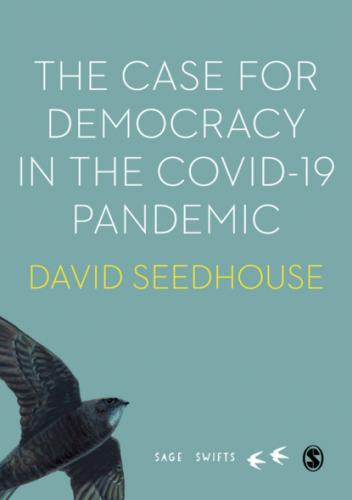The Case for Democracy in the COVID-19 Pandemic. David Seedhouse, Dr.
SAGE SWIFTS Series
SAGE SWIFTS Series
ii
ii
SAGE SWIFTS Series
The SAGE SWIFTS series showcases the best of social science research that has the potential to influence public policy and practice, resulting in positive social change. We strongly believe that the social sciences are uniquely positioned to make this impact and thus benefit society in a myriad of ways.
SAGE SWIFTS celebrate and support the impact of quality empirical work that provides a provocative intervention into current debates, helping society to meet critical challenges going forward.
Titles in the series include:
The Case for Democracy in the COVID-19 Pandemic
David Seedhouse
Los Angeles
London
New Delhi
Singapore
Washington DC
Melbourne
SAGE Publications Ltd
1 Oliver's Yard
55 City Road
London EC1Y 1SP
SAGE Publications Inc.
2455 Teller Road
Thousand Oaks, California 91320
SAGE Publications India Pvt Ltd
B 1/I 1 Mohan Cooperative Industrial Area
Mathura Road
New Delhi 110 044
SAGE Publications Asia-Pacific Pte Ltd
3 Church Street
#10-04 Samsung Hub
Singapore 049483
Editor: Natalie Aguilera
Assistant editor: Eve Williams
Production editor: Manmeet Kaur Tura
Copyeditor: Sarah Bury
Proofreader: Clare Weaver
Indexer: Cathryn Pritchard
Marketing manager: George Kimble
Cover design: Wendy Scott
Typeset by: Cenveo Publisher Services
Printed in the UK
At SAGE we take sustainability seriously. Most of our products are printed in the UK using responsibly sourced papers and boards. When we print overseas we ensure sustainable papers are used as measured by the PREPS grading system. We undertake an annual audit to monitor our sustainability.
© David Seedhouse, 2020
Apart from any fair dealing for the purposes of research or private study, or criticism or review, as permitted under the Copyright, Designs and Patents Act, 1988, this publication may be reproduced, stored or transmitted in any form, or by any means, only with the prior permission in writing of the publishers, or in the case of reprographic reproduction, in accordance with the terms of licences issued by the Copyright Licensing Agency. Enquiries concerning reproduction outside those terms should be sent to the publishers.
Library of Congress Control Number: 2020940556
British Library Cataloguing in Publication data
A catalogue record for this book is available from the British Library
ISBN 978-1-5297-5181-9
eISBN 978-1-5297-5205-2
Dedication
This book is for my father, Charles Donald Seedhouse, who died as a young man, and who I dearly hope would be proud of the effort it has taken to write it.
It is also for Dr Edward (Ed) Harris, of St Helens in the UK and Greenlane Hospital in Auckland, New Zealand. He died as an older man and was also like a father to me. I think Edward would have disagreed with what he may have called my ‘cavalier attitude’ towards the pandemic, as well as with a lot of the book's discussion. But whether he agreed with it or not, I know he would have insisted I write it.
About the Author
David Seedhouse is a philosopher, writer and software developer. His many books explore the nature of health, rationality and ethical reasoning. The question that runs through all his work, including the present text, is: how can we make the most effective, justifiable decisions?
Acknowledgements
In part, writing this book was a form of personal therapy. Not only did I need to try to understand the extreme human reaction to COVID-19, but I needed to cope with the mental and emotional impacts I was personally experiencing.
The more I tried to navigate the pandemic's tangled web, the more I felt just a little more in control. Many restrictions were imposed on everyone's lives, but at least I was free to form my own judgements. The ability to express these, with the expectation that I would be able to communicate and share my thoughts with others, was a massive encouragement to me. I profoundly thank my two editors at Sage, Alex Clabburn and Natalie Aguilera (my editor for this book), for having the faith that I could deliver this ambitious project.
I would also like to thank Vanessa Peutherer for her love and support in difficult circumstances, and for tolerating my determination to reach an implausible deadline. Every day Vanessa would send me links and articles of unfailing relevance, and these have greatly strengthened the evidence-base of the book.
Her sons, James and Zak, and James's partner Ava, have also been remarkably tolerant of the stresses I have both experienced and caused. I thank all three of them.
I am extremely grateful to my friends and colleagues David Ball, David Marks, and Michael Loughlin for supporting my book proposal so enthusiastically, and helping me find information I needed.
Finally, this book was written and published quickly. While I have checked facts where they exist, and attempted a steady, logical argument, there are bound to be errors of various kinds. I take full responsibility for these. I hope the freshness and sense of discovery in words minimally edited is some compensation.
In this world nothing can be said to be certain, except death and taxes.
The Works of Benjamin Franklin, 1817
Never doubt that a small group of thoughtful, committed, organised citizens can change the world; indeed, it's the only thing that ever has.
Margaret Mead
About this Book
This book has a simple theme and structure, anchored in a troubling dichotomy between certainty and uncertainty. The most striking element of the COVID-19 pandemic has been the confidence of governments in their measures, when almost everything is highly uncertain and much – including knowing whether the measures will work – is just not known. This incongruity is reflected in several other imbalanced dualities, for example, science versus community values, risk management versus civil liberties, epidemiological
